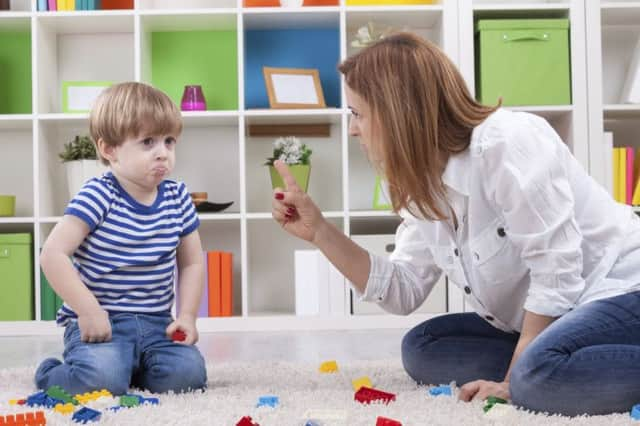The family way


What do you do - apart from scream?
If the kids are misbehaving and won’t listen to your desperate attempts to stop World War Three, you may very well be at your wit’s end. And for many parents, that means shouting and punishing in an often futile attempt to get the kids to stop playing up.
But it doesn’t have to be that way, says Dr Daniel Siegel and paediatric psychotherapist Dr Tina Payne Bryson, authors of the new book No-Drama Discipline.
Advertisement
Hide AdAdvertisement
Hide AdThe pair champion a ‘relational’ style of discipline which, rather than relying on punishment and consequences, aims to provide coercion-free discipline that builds on children’s innate desire to please their parents and get along well with others.
Sounds too good to be true? Apparently not - if you can ‘connect and redirect’ with your children, instead of flying off the handle.
Bryson explains that rather than behavioural issues leading to highly emotionally-charged confrontations, the best way to effectively discipline a child and build a positive relationship is through calmly talking to them, and then helping them look at how they can deal with their feelings better in the future. They call this ‘connect and redirect’.
“The whole point of discipline is to teach,” stresses Bryson.
Advertisement
Hide AdAdvertisement
Hide Ad“Punishment might shut down a behaviour in the short-term, but teaching offers skills that last a lifetime.”
She points out that discipline moments are often when children’s emotions are running high, which is likely to be when they most need connection and soothing from their parents.
“Connecting is about attuning to what our child is experiencing and feeling, and empathising with them.”
Once a child is feeling understood, parents can redirect their behaviour by addressing the misbehaviour.
Advertisement
Hide AdAdvertisement
Hide AdBryson explains that if a child has just told his parent ‘I hate you!’, his parent might respond by saying, ‘You can’t talk to me like that!’.
“But that doesn’t reduce the drama or build skills,” she explains.
“With the connect and redirect approach, we’d connect with the emotions first, so we’d say something like, ‘You’re feeling really angry at me. I’ll listen and I’ll be here with you’.
“Once your child feels understood and connected, then it’s time to redirect the behaviour.”
Advertisement
Hide AdAdvertisement
Hide AdSo mum or dad could point out that what the child said was hurtful, ask what he needs to do to make it right, and what will he do differently the next time he’s angry with them.
The principle behind No-Drama Discipline is related to what the authors call a ‘whole-brain approach’ , whereby using connection and redirection means the gradual formation in the child’s developing brain of connections that build emotional and social skills, helping them develop self-control and a moral compass.
The idea is that instead of just focusing on behaviour, parents also look at the meaning, intentions, and emotions behind the behaviour and then address them with the child, thus helping their brain develop in a way which facilitates self-discipline.
“The moments when discipline is called for are actually some of the most important moments of parenting, times when we have the opportunity to shape our children most powerfully.”
Advertisement
Hide AdAdvertisement
Hide AdHowever, while this sounds like the solution to many family flashpoints, it’s tough, or sometimes even impossible, to control emotions enough to ‘connect and redirect’.
Siegel explains: “What at first may not come naturally and takes energy and intention can, with practise science tells us, become more easily achieved with less energy and conscious effort - that’s how we as parents learn new approaches.
“But there’s no such thing as ‘perfect parenting’, and we certainly can’t achieve the goals we set for ourselves all the time.
“In the long-run, though, much time and energy will be saved with this approach.”
Advertisement
Hide AdAdvertisement
Hide AdBryson suggests that one “magic” tool which quickly soothes a fractious child and also helps calm the parent, is for the parent to get down below eye level with a relaxed body posture, stop talking so much, and instead say something like, ‘You’re really frustrated at the moment. I’m right here with you’, in a very soothing tone of voice.
“The child will often calm much quicker than if the parent’s angry, standing over them with an aggressive posture,” she explains.
“Sitting below eye level in a relaxed posture communicates to the child’s brain ‘no threat’ and the child can stop being in defence-fight mode.”
The non-threatening posture also communicates to the parent’s brain that they don’t have to fight, and that their job is to calm things down and nurture, she says.
Advertisement
Hide AdAdvertisement
Hide Ad“Then the parent stays calm, the child calms down, and that’s when the teaching happens - when we effectively address the behaviour.”
:: No-Drama Discipline by Daniel J Siegel and Tina Payne Bryson is published by Scribe, priced £12.99. Available now.